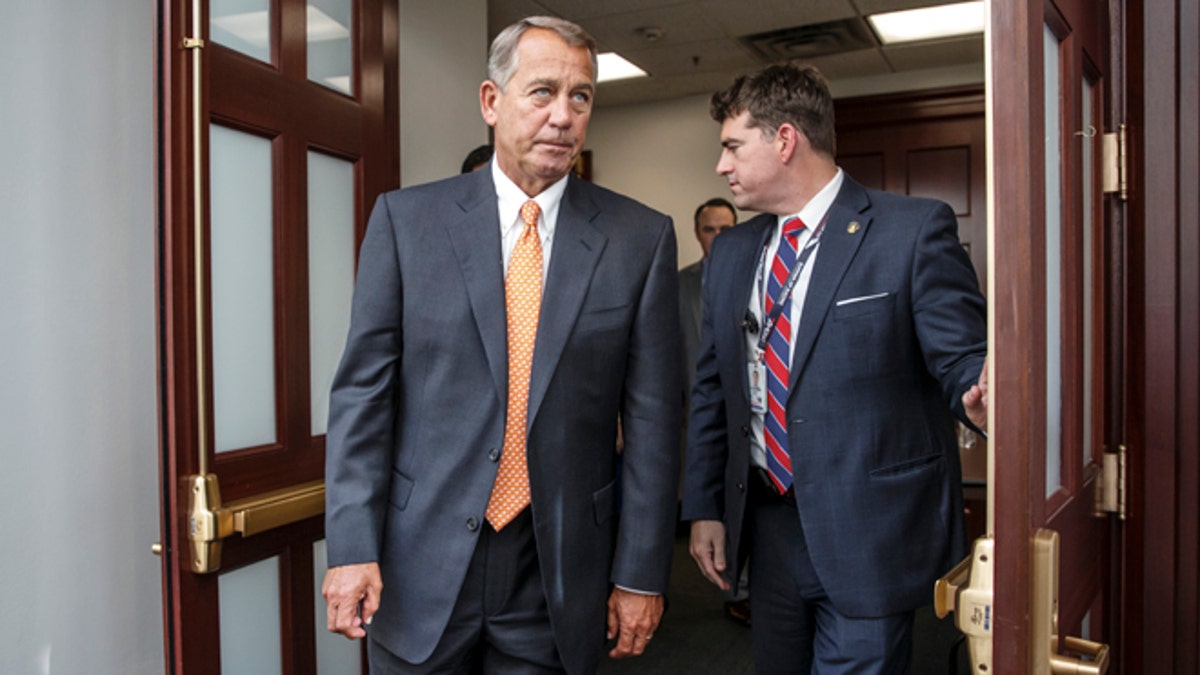
House Speaker John Boehner with House Republicans on Capitol Hill Friday, Jan. 9, 2015.
Immigration has always been a political minefield. After the House passed last week a GOP-led Homeland Security funding bill that includes amendments to undo President Obama’s latest moves on the issue, observers are wondering if the hard line on immigration will be detrimental to Republicans in the 2016 presidential election.
“There are some conservatives who truly believe we can still win elections without getting a sizable percentage of the Latino vote,” said Alfonso Aguilar, a former George W. Bush administration official and executive director of American Principles Project's Latino Partnership, a conservative group. “But there’s no way. We have to win Colorado, New Mexico, Nevada, and Florida.”
Meanwhile, GOP leaders vehemently deny that their strict moves on immigration in recent weeks are in any way hostile to Latinos. They say the actions are aimed at Obama, and his overreach on immigration.
Frank Sharry, the head of America’s Voice, says Republicans are in a crucial position to claim immigration as an issue, and any major reform as their own – in the way that former President George W. Bush almost did, as well as Sen. John McCain of Arizona, to name a few.
“They have the best opportunity ever, right now, to pass immigration reform and share credit,” he told Fox News Latino.
The rhetoric on immigration is, again, prickly. And that worries some Republicans who fear that the impressive 35 percent of the Latino vote that their candidates received in the midterm elections last November will – just as in 2012 – fail to translate into a fortified Latino-GOP relationship going into the 2016 election.
“They’re starting out with their left foot,” said Aguilar. “Yes, it’s true that President Obama should have waited and tried to work with the Republicans in the new Congress, and try to work on immigration legislation, but instead of trying to undo what the president did, they should show what they’re for.”
“They’re not making promises about doing anything constructive on immigration. They’re just attacking, that’s crazy,” he added.
Aguilar expressed concern that the window of opportunity for the GOP to gain ground on immigration, and with Latino voters, will remain open for a short time this year. Then, once the 2016 elections dominate, few will want to touch the divisive and touchy subject of immigration, he said.
"They're being bullied by a small majority of immigration restrictionists like Steve King and Jeff Sessions, anti-immigrant population control groups and conservative radio talk show hosts," he said.
On his part, Sharry said he is baffled by actions by Republicans that seem to go against the less restrictive approach that many in the party said would be crucial after Romney’s devastating loss.
“I find it stunning that the Republican Party, which was pummeled by Latino voters in 2012, promised to take action no immigration reform after the election, helped pass a bill in the Senate in 2013, and now has lurched so far back to the right,” Sharry said. “How can you be a Latino immigrant in this country and not think ‘The Republicans hate me.’”
As attention homes in on the 2016 presidential election, many political observers believe that history may repeat itself.
“The 2010 election actually paints a very bright picture of the Republican Party’s relations with this country’s growing Hispanic population,” wrote Rep. Lamar Smith, a Texas Republican, reflecting the view of many in his party at the time.
When the exit poll results on the Latino vote in the 2010 midterm elections came in, many Republicans smiled.
A historical 38 percent of Latino voters had given their support to Republican candidates running for Congress.
Then came the GOP presidential primaries leading up to the 2012 election. And the tough talk about immigration. And the term “self-deport.” And a huge Latino voter backlash.
Republican presidential nominee Mitt Romney got a paltry 27 percent of the Latino vote – less than half than the 71 percent that President Barack Obama racked up.
The road to the 2016 election barely has begun, and can take all kinds of unimaginable twists and turns between now and election night.
“For the electorate, 2016 is still a long time away,” said Louis DeSipio, a political science professor at the University of California-Irvine. “If the tone of the campaign picks up [the issue of] the vote [to block the executive order], then the Republicans will have a hard time doing as well as they did in the last two cycles. If in the primaries immigration remains quiet, then voters, including Latinos, will forget.”
If it is still a burning issue, any Republican vying for his party’s nomination will have to get through the primaries, when conservatives hold a great deal of sway.
“The candidates need political courage,” Aguilar said. “In the primaries, they’re afraid of having their conservative credentials questioned, so [some] are afraid of discussing the issue.”











































